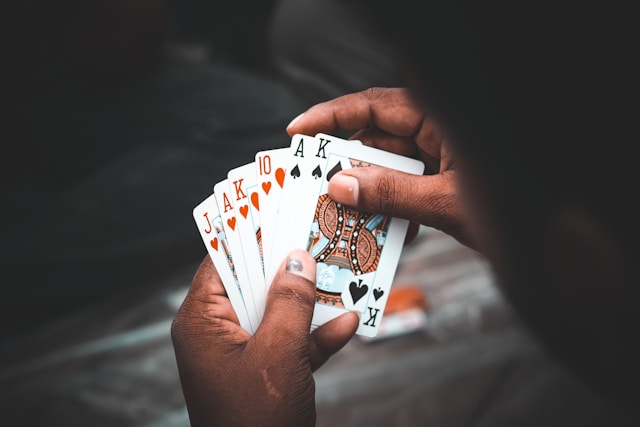What Makes a Good Poker Player and How You Can Become One
A good poker player doesn't just rely on luck. It takes skill, patience, and strong decision-making. You need to read people, manage emotions, and stay focused. Every move counts. One wrong decision can ruin a winning hand.
The best players adapt quickly. They don't panic under pressure. Instead, they observe, analyze, and act with confidence. Want to know what makes a good poker player stand out? It's not just about bluffing or winning pots. It's about consistency and control.
Mental Traits You Need to Develop
Poker is a mind game. So, your mindset matters more than your cards.
- Discipline: Stick to your strategy. Avoid emotional decisions.
- Patience: Don’t play every hand. Wait for the right moment.
If you lack these, you might struggle. It's easy to chase losses or play too loosely. That’s how bankrolls disappear fast.
Top 5 Skills Every Poker Player Needs
1. Math and Probability Skills
Know your odds. It helps in pot decisions and betting strategies.
2. Reading Opponents
Watch body language. Listen to betting patterns. Are they confident or bluffing?
3. Emotional Control
Don’t let wins or losses shake you. Stay cool and balanced.
4. Bankroll Management
Always play within your limits. Never risk your whole stack in one shot.
5. Adaptability
Adjust to different players. Tweak your strategy when the table changes.
Online vs. Live Poker
Both forms have pros and cons. Online games are faster. You face more hands per hour. But live games let you read people directly. You see faces, hear voices, and feel tension.
Want to sharpen instincts? Try live games. Want to build speed and stats? Go online. Many new players mix both to grow.
Also, platforms like Win Beast offer online practice rooms. But don’t treat them like shortcuts. Use them to learn, not chase luck.
Famous Players Who Nail These Traits
Let’s look at some names. They show us what makes a good poker player in real games.
- Sashimi poker player style is aggressive yet smart. She blends intuition with data.
- Britney poker player, knows how to use silence and patience as tools.
- Vanessa poker player, is all about control and observation. Her table reads are on point.
- Monarch poker player mixes math with gut feeling. It’s a rare but deadly combo.
- Kelly poker player, focuses on long-term gains. She never gets caught chasing short-term wins.
They each bring something different to the table. But they all stick to the basics.
Common Mistakes Beginners Make
Even the smartest people fall for these errors. Here are two common ones:
- Overplaying weak hands: Just because you're bored doesn’t mean you should play.
- Ignoring position: Being last to act gives you power. Don’t waste that edge.
Let’s be honest. We’ve all made these mistakes. The key is learning and not repeating them.
Strengths of Top Poker Players
Sashimi
Strength: Analytical and bold.
Style: Aggressive.
Weakness Avoided: Emotional decisions.
Britney
Strength: Patient and calm.
Style: Passive.
Weakness Avoided: Overplaying hands.
Vanessa
Strength: Sharp reads and composure.
Style: Balanced.
Weakness Avoided: Poor table awareness.
Monarch
Strength: Stats-driven and creative.
Style: Hybrid.
Weakness Avoided: Playing by instinct only.
Kelly
Strength: Consistent and smart with bankroll.
Style: Tight.
Weakness Avoided: Chasing losses.
Steps to Improve Your Game
Let’s break it down. Becoming a solid poker player takes time, but it’s doable.
1. Study Every Week
Read books, watch pros, or join forums. Learn how different people think.
2. Track Your Progress
Keep notes on hands played. Review your mistakes and wins.
3. Practice Smartly
Play low stakes first. Test strategies without big losses.
4. Stay Healthy
Sounds odd? A clear mind needs rest, good food, and breaks.
5. Play with Better Players
You improve faster when you're the weakest at the table.
Types of Poker Players You Will Meet
Here are two types of players you’ll face often:
- Loose-Aggressive: Plays many hands, bets often. Hard to read but easier to trap.
- Tight-Passive: Only bets with strong hands. Easier to predict but harder to beat heads-up.
Recognizing player types helps you respond better. It’s like adjusting your sails to the wind.
Mindset Before You Sit at the Table
Don't rush. Think of poker as a test of character. Are you patient? Can you handle losing hands? If not, work on that first. Poker doesn't forgive recklessness.
Start each session with one goal. Maybe it’s to read players better. Or avoid tilt. Don’t make winning the only target. Progress matters more than profit.
How to Avoid Burnout as a Player
Burnout is real in poker. Long hours and pressure can kill your focus. So:
- Take breaks often: Even five minutes off can refresh your brain.
- Set time limits: Don’t let poker eat your whole day.
Remember, poker is a marathon, not a sprint. Better decisions come with a rested mind.
The Power of Confidence Without Arrogance
Confidence matters. It shows in your bets, your reads, your folds. But overconfidence hurts. Many players crash after early wins. Stay humble. Learn every session. Stay curious.
Even the best poker player can lose. The goal is to win more often than not. Keep your ego in check.
Conclusion: Build Skill, Not Just Luck
So, what makes a good poker player? It’s not one thing. It’s a mix of traits, habits, and mindset. From emotional control to bankroll planning, the best players never stop learning. They treat poker like a craft, not a game of chance. Want to join them? Start small. Stay sharp. Play smart.

